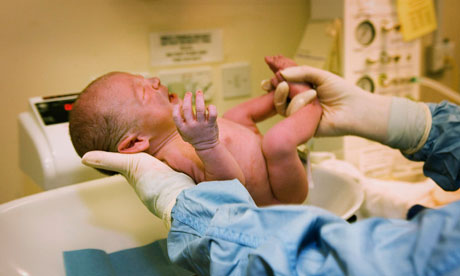
People who spent more than a month in hospital as a child or had a low birth weight are more likely to find themselves passed over for promotion in later life, a study suggests.
In a paper published in the American Journal of Epidemiology, academics analysed the health of 8,300 British Whitehall workers between 1991 and 2004, and after crunching the data concluded that some civil servants get to the top because they start off healthier.
The study, partly funded by the British Heart Foundation and the Medical Research Council, suggests early health problems and lower birth weight can predict career trajectory and earning power.
The academics found that people doing well in their career were less likely to have suffered illness resulting in a hospital stay as a child, and were more likely to have been heavier babies. Meanwhile, those who had a low birth weight, or who had spent four or more weeks in hospital in childhood, had less chance of promotion and earned less.
Professor Mika Kivimaki from University College London, who led the research, said: "Our new study shows a link between poor health in infancy and worse future job prospects. In our work we show hospitalisation in childhood produced lower social-economic ranking later in life, and a higher birth weight is also related to a better position in life. Not that everyone who gets ill as a child will fail to get a good job. This is about probability."
He cautioned that the work related only to civil servants, and that extending it to the wider workforce needed "more work". However, he said that bureaucrats in the lower grades had a greater risk of heart disease than those higher up the ladder. "Our findings do demonstrate very clearly that your social circumstances can affect your risk of heart disease – underlining real health inequality problems that exist in the UK today."
Experts say this confirms the long-held view that the human pecking order is strongly related to health and longevity. Danny Dorling, professor of human geography at the University of Sheffield, pointed out that children can be disadvantaged by ill health, and disadvantage contributes to poor heart health later in life. "People are generally born pretty equal but if you spend a month in hospital it has to be pretty serious. It will set you back in studies and probably affect you throughout life."
In a separate report underlining how life chances are determined by health and wealth, the Liberal Democrat thinktank CentreForum has called for the government to consider making a portion of child benefit conditional on families taking up parenting classes to break the culture of "social immobility" in Britain.
The thinktank argues that poor families need to focus on the early years, and that financial bonuses should be considered to incentivise good behaviour. It points out that while only one in nine children with parents from low-income backgrounds reach the top income bracket, almost half of those with rich parents remain there.
The report calls for a "five-a-day" checklist to be taught to all parents which includes reading to children, playing with them and holding a conversation without the television being on.
The report's author, Chris Paterson, said: "It is only by taking steps which actively encourage awareness and participation among parents from lower-income backgrounds that engagement with parenting and the home environment can move beyond being a general tool for child development and become a genuine weapon against disadvantage."
Sarah Teather, the Lib Dem children's minister, welcomed the report. "It recognises the importance the government is placing on the foundation years and consequently on child development as a means of improving social mobility. We are already commissioning new advice and support services for parents. We are also exploring, with a wide range of stakeholders and professionals, what additional parenting support and advice for families might look like, drawing on our collective knowledge of what parents and families say they want and need. At the same time we are supporting the sector to lead a campaign on the importance of parenting and parenting skills."

